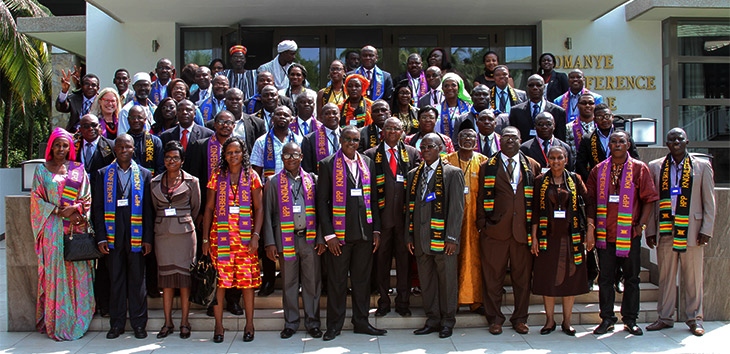The Health Policy Project ended in 2016. Work continued under Health Policy Plus (HP+) until 2022.
NEWS & VIEWS

Participants at the Health Policy Project West Africa end-of-project Innovation Exchange. Photo by Health Policy Project.
September 9, 2015
By Rachel Kiesel and Andrew Zapfel, Health Policy Project/Futures Group
Our goal as members of the USAID- and PEPFAR- funded Health Policy Project’s (HPP) Monitoring and Evaluation (M&E) team is simple: we want to tell how the Health Policy Project, working in over 30 countries across the globe, betters the lives of people through policy, advocacy, governance, and finance. We want to demonstrate that our efforts have strengthened the voices of advocates, built the capacity of government officials to use data and modeling tools to implement improved policies, and facilitated parliamentarians and other decision makers in making impactful policies based on evidence.
HPP is set to end in September 2015 after a five-year run, and it is more important now than ever to document our stories and provide the global health community with recommendations and lessons learned on how best to implement policy and advocacy programs. HPP had an extensive portfolio in West Africa, working in eight Anglophone and Francophone countries. The M&E team spent a lot of time sifting through reports and reviewing emails from the field telling us about progress. In April and June of 2015, we were able to witness this work firsthand when we travelled to Ghana and Togo to assess HPP’s support of in-country stakeholders.
HPP’s work in Ghana since 2010 has been impressive, building the capacity of government agencies, civil society organizations, and advocates in HIV data use, family planning (FP) advocacy, and human rights for marginalized populations. We spoke with several government officials and civil society organizations about their experiences working with HPP. Through the use of HPP models and tools, the National Population Council was able to effectively advocate for the inclusion of family planning in the national insurance bill. Advocates developed an advocacy plan with HPP support, and were able to get personal lubricants on national essential medicine lists to provide needed resources to key populations in the response to HIV.
Still, all advocates shared the thought that the work was not over. Advocacy is an ongoing process, and all HIV and FP stakeholders must continue to push for more data, stronger tools for sharing information, and better polices grounded in human rights. Continued work is needed to ensure that both countries reach their full potential in responding to the health needs of their citizens. Through further partnerships and advocacy, this work can be achieved.
In Togo, HPP’s HIV and family planning/reproductive health work has yielded compelling results, including the application of the Repositioning Family Planning Framework. This resulted in translation of the FP law into local languages; policy gap analyses that highlighted policy barriers to focus advocacy efforts; the inclusion of MSM (men who have sex with men) sensitivity trainings at the Ministry of Health to better engage government stakeholders in MSM advocacy efforts; and advocacy capacity strengthening work with MSM groups to support focused advocacy efforts.
Each partner we met with in Togo viewed HPP’s support as a largely positive collaboration that advanced their organizational goals and objectives. These organizations also viewed HPP as a key partner to move policy and advocacy objectives forward. One stakeholder noted that HPP is unique, as no other organization works in the domains of advocacy, research, and policy. The capacity building activities (training, mentoring) were viewed favorably, and the overall presence of HPP in regional partnerships—including the Ouagadougou partnership—was viewed as an asset. Many partners voiced the need for community engagement in future projects to support the implementation of key policy objectives and engage civil society at the community level in support of advocacy efforts.
Understanding the needs of partners has been a core tenet of the Health Policy Project. Continued work in policy, advocacy, governance, and finance will require further commitment to building the capacity of all stakeholders involved in the response to HIV and family planning, and to ensuring that their voices are heard in the development of policies and strategic plans. We look forward to continuing this work and making sure these stories are told.
What's New
- Something to Build On: “Innovation Exchange” Celebrates the Health Policy Project’s Close and a New Beginning
- What Will it Take for Tanzania to Achieve ART Targets and Ensure Long-Term Sustainability of the HIV Response?
- Helping Kenya’s County Leaders Advocate for Increased Health Investments
- HPP Holds Working Meeting on Ensuring Responsible PEPFAR Transitions for Key Populations
- Health Policy Project Celebrates 2016 International Women's Day
- HPP Staff Participate in White House Conference on HIV Stigma Reduction

